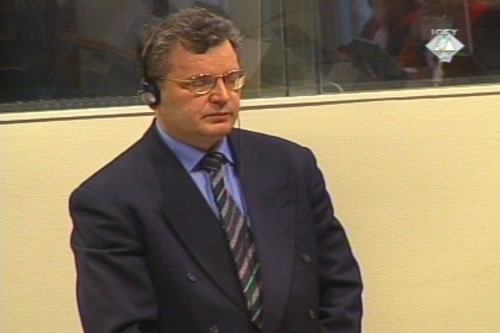Home
WHAT PUNISHMENT IS FIT FOR THE "UNIQUE CASE" OF MILAN BABIC?
Will judges take into account the specific circumstances that make the case of Milan Babic unique in the Tribunal's history when they impose a sentence on the former Croatian Serb leader?
 Milan Babic in the courtroom
Milan Babic in the courtroom The case of Milan Babic, who will be sentenced tomorrow for his participation in a joint criminal enterprise whose goal was the forcible and permanent removal of non-Serbs from large areas of Croatia, is in many respects unique in the Tribunal's ten-year history.
In September 2001, when he learned from the media that his name was among 15 participants in a joint criminal enterprise listed in the "Croatia indictment" against Slobodan Milosevic, Babic called the Office of the Prosecutor and agreed to be interviewed as a suspect, although he knew anything he said could be used against him. Over a number of days at a secret location in Serbia--in the presence of legal counsel appointed by the Tribunal Registry--Babic gave a series of interviews to Hague investigators.
At the beginning of those interviews, Babic claimed he was shocked by the allegations, but gradually he opened up about events in Croatia and his role in them. As the third round of interviews drew to a close in late February 2002, he began taking responsibility for events between 1991 and 1995, when he was a high-ranking official of what was then the RSK.
At his sentencing briefing, prosecutors noted that Babic gave investigators a large amount of useful information and documents during his interviews. He also confirmed the authenticity of a large volume of documents already in the prosecution's possession. Babic, as the prosecutors said, "saved enormous resources and effort" that would otherwise have had to be spent obtaining or authenticaing those documents.
Babic's 12-day testimony at Slobodan Milosevic's trial is also unique: the prosecution claims that an "unprecedented" amount of direct evidence about the role of the former Serbian president in the war in Croatia was presented.
Milan Babic is also the first accused in the history of the Tribunal for whom no arrest warrant had to be issued: he surrendered to the Tribunal as soon as he was informed there was an indictment against him.
The uniqueness of Babic's case can also be seen in his guilty plea, which differs substantially from those of the other accused. With the exception of Drazen Erdemovic, all the others pleaded guilty after a long time in detention, when it became clear to them that the prosecution had incontrovertible evidence of their guilt. Babic pleaded guilty soon after the indictment was made public, and he only sought a 30-day delay in entering his guilty plea in order to give the sides enough time to work out a plea agreement.
At his sentencing hearing held in early April, the defense called upon the chamber to compare his case to that of Biljana Plavsic. She was sentenced to 11 years in prison, even though her guilty plea, remorse and cooperation cannot be compared to Babic's. The prosecution and defense recommended the same sentence for Babic.
